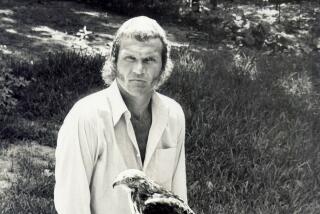The Good Time Gospel Boys by Billy Bittinger (St. Martin’s: $15.95; 256 pp.)
- Share via
Aquartet of white-suited Alabama albinos playing the Southern revival circuit for sex, money and buttermilk-dipped fried chicken gives this novel its title. In their whiskey-guzzling travels between tent meetings and rickety Holy Roller churches, the Good Time Boys--alas, minus their snake-handling, golden-haired feature attraction, snared earlier by movie director D. W. Griffith--eventually come to Taylor Springs, a fictional 1930s Kentucky town suffering both a crop-killing drought and a deluge of sensuality.
Taylor Springs is near a sulfurous pool frequented by game in pioneer days and by health-seeking spa-goers after the buffalo were dead. Folks there are masters at violating the Ten Commandments--the Seven Deadly Sins are guidelines for living. A doctor whose wife has denied him sex dies in the throes of orgasm while allegedly on a house call. A preacher meeting with a Sunday School teacher zestfully succumbs to nondenominational temptation. Two high school boys have a shotgun shoot-out over their two-timing paramour. A 300-pound woman spends her days ingesting huge quantities of cholesterol while waiting for her once-a-year, five-sided sexual rendezvous. In fact, it’s a rare citizen who isn’t having his or her clock cleaned whenever and wherever the opportunity presents itself--on a bus, in the woods, against a wall, sometimes even in bed.
But while passions for the flesh and fudge cake are not publicly acknowledged in Taylor Springs, there are otherwise few secrets in town. Hypocrisy is the glue that binds, and blinds. As several characters remark, many things are better left unsaid--no one, they admit to themselves and others, wants to face the moral accounting that would come due. Not least, people would have to face up to the jumbled genes linking most of the town’s white and black families. The school superintendent’s black chauffeur and servant, named Khaki for his light skin, is also the superintendent’s son, for instance.
Spanning the decade of the 1930s, “The Good Time Gospel Boys” seems at first a social satire, an almost affectionate slap at the small-mindedness and self-delusion of small towns. With a pecking order more rigidly defined than that of a European court, Taylor Springs is the kind of place where owning a newfangled kerosene stove is the Depression-era equivalent of winning big on “Wheel of Fortune.” It is a self-contained place where all references are local. As one visitor observes, “ . . . it’s as if they have no idea of what’s going on in the rest of the world. Their world begins and ends in this little valley.”
At this level, Billy Bittinger’s first novel is also a sharp-eyed report on the folkways of the border South. The author, a 53-year-old mother of four, describes voodoo charms and country cooking with assurance and uses such down-home devices as church socials to bind her characters in a tangle of relationships, suspicions and petty intrigue.
But while the novel at first seems mainly a nostalgic look at bygone days, it soon develops into a story about real sin and real consequences far more deadly than pulpit fire and brimstone. The bills for long-hidden murders and long-suppressed mania come due in August, 1940, on the Good Time Gospel Boys’ last visit to Taylor Springs. On that night, half the town is out roaming the darkness on separate errands and assignations. By daybreak, all the plot strands--and one of the characters--are tied up. The novel ends in a crescendo of violence, unexpected in its intensity because the author has prepared the way with offhanded skill.
As a first novel, this is an impressive, satisfying work, an admirable debut. Tragic and comic, it has a whole town full of flawed preachers, lusty cheerleaders, vengeful rabbit hunters, social pillars crumbling with unspeakable secrets, wounded children. All this lifts the book beyond its regional limits. “The Good Time Gospel Boys” deserves to be widely read, for its laughs and for its sense of good and evil.
More to Read
Sign up for our Book Club newsletter
Get the latest news, events and more from the Los Angeles Times Book Club, and help us get L.A. reading and talking.
You may occasionally receive promotional content from the Los Angeles Times.








